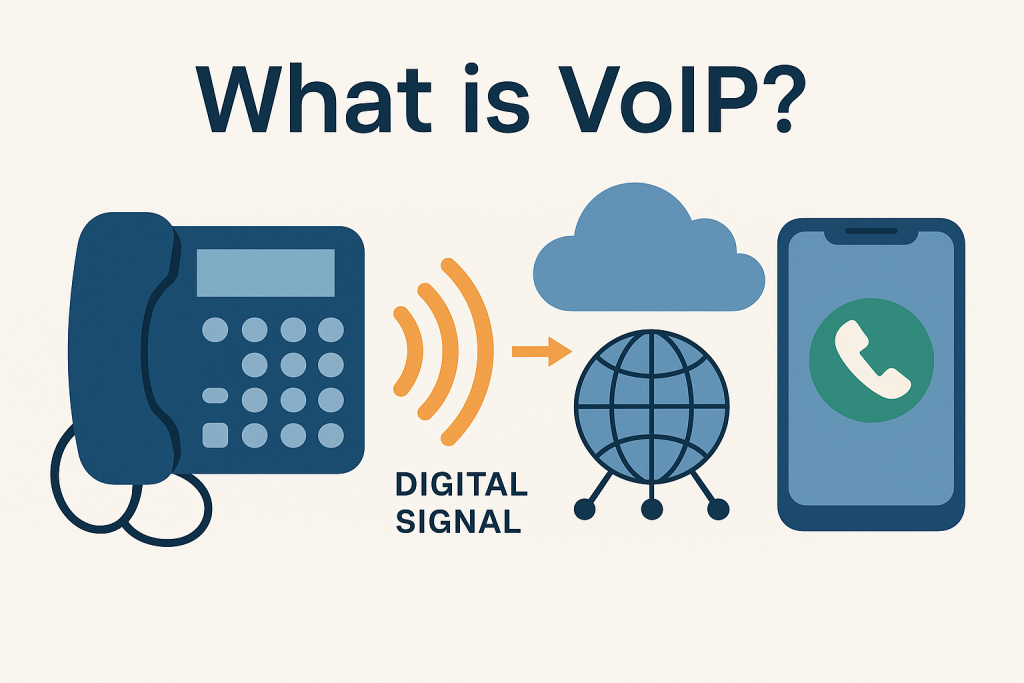
Voice over Internet Protocol (VoIP) has become one of the most transformative technologies in business communication. Across South Africa, companies are realising that the traditional phone system — once the backbone of office communication — is now an expensive and outdated model.
VoIP offers a flexible, feature-rich, and cost-effective solution that meets the demands of modern business: remote teams, hybrid work, and nationwide operations that require reliable and scalable communication tools.

What is VoIP?
VoIP (Voice over Internet Protocol) is a communication technology that allows you to make and receive calls over the internet instead of traditional telephone lines. It converts your voice into digital packets, transmits them via your broadband connection, and reassembles them at the receiver’s end — all in milliseconds.
In simple terms, it replaces your Telkom landline with an internet-based system. You can make calls through:
- Desk phones (IP phones)
- Softphones on computers or laptops
- Mobile apps on smartphones or tablets
- Web-based VoIP portals
For South African businesses, this means no more expensive line rentals, no expensive PBX systems, and no waiting for physical installations — just fast, flexible connectivity.
Why South African businesses are switching to voip
1. Significant Cost Savings
Cost reduction is one of the biggest motivators for switching to VoIP. Traditional landlines often come with high monthly line rentals and per-minute call charges — especially for inter-provincial or international calls.
With VoIP:
- Monthly fees are lower – many business VoIP plans range from R100 to R500 per user.
- No physical lines or PBX hardware – everything runs in the cloud.
- Cheaper call rates – calls between VoIP users are usually free, and international rates are a fraction of Telkom’s prices.
- No long-term contracts – most providers offer flexible month-to-month plans.
For companies with multiple branches or remote staff, these savings add up fast.
2. Flexibility and Scalability
Traditional phone systems are limited by physical infrastructure. Expanding your team or opening a new branch often requires new lines, new hardware, and site installations.
VoIP scales instantly. Adding a new user is as easy as creating a new account on your provider’s dashboard. Whether you’re onboarding new sales agents or setting up a temporary call centre, VoIP lets you scale up (or down) within minutes.
It’s also not location-independent. Employees can work from home, at the office, or on the road — all using the same business number and extension. This is especially valuable in South Africa, where remote and hybrid work have become the new normal.
3. Reliability and Business Continuity
Modern VoIP providers in South Africa design their systems with redundancy and failover in mind. If your fibre connection goes down, calls can automatically divert to mobile devices or alternative numbers — ensuring you never miss a client call.
Many providers also offer:
- 99.9% uptime guarantees
- HD voice quality
- Automatic call rerouting during load shedding or outages
This reliability ensures your business remains operational even when traditional infrastructure fails — a key advantage in South Africa’s unpredictable power and connectivity environment.
4. Advanced Features That Empower Business Growth
VoIP is more than just a phone replacement — it’s a full communication suite. Even small businesses can now access features that were once reserved for corporate call centres.
Common features include:
- Auto-attendants (virtual receptionists)
- Voicemail-to-email transcription
- Call forwarding and call queues
- Conference and video calling
- CRM integration (Zoho, HubSpot, Microsoft Teams, etc.)
- Call analytics and reporting
These features streamline customer interactions, boost team collaboration, and allow managers to track performance in real-time.
5. Seamless Integration with Modern Business Tools
Modern VoIP systems integrate directly with your existing software. For instance, when a customer calls, their details can pop up on your CRM screen — along with their account history and previous interactions.
This integration creates a more connected workflow across departments like sales, support, and admin, reducing time wasted between tools and improving the customer experience.
VoIP vs. Telkom Landlines in South Africa
| Feature | VoIP | Telkom Landline |
| Cost | From R175–R500 per user | Higher monthly line rental |
| Installation | Fast and remote | Physical line installation required |
| Scalability | Add or remove users instantly | Requires new lines |
| Mobility | Use anywhere with internet | Fixed to one location |
| Features | Voicemail, routing, conferencing | Basic calling only |
The cost and flexibility gap is widening every year — especially as Telkom continues to phase out copper infrastructure and push users toward digital and fibre-based systems.

Setting Up VoIP for Your Business
What You’ll Need
- Stable Internet Connection: Fibre is ideal. Aim for at least 100 kbps upload speed per concurrent call.
- VoIP Devices: Choose between IP desk phones, softphones, or mobile apps.
- A Reliable VoIP Provider: Look for one that offers local support and a 99.9% uptime SLA.
- Network Configuration: Ensure Quality of Service (QoS) is enabled so voice traffic is prioritised over general data.
Setup Process
- Choose a plan that suits your call volume and features.
- Port your existing number — most providers in South Africa allow geographic number porting (e.g., 021, 011, 031).
- Configure devices or install apps on your staff’s computers and smartphones.
- Test and optimise — confirm call quality, network stability, and backup routing.
Most installations can be completed within one business day, without interrupting existing communication.
Understanding Security in VoIP
As with any internet-based system, VoIP must be secured against threats such as eavesdropping, spoofing, or call fraud.
To protect your business:
- Use providers with end-to-end encryption (TLS/SRTP).
- Activate firewalls and intrusion detection on your network.
- Regularly update VoIP firmware and software.
- Use strong, unique passwords for each extension.
- Monitor call patterns for unusual activity.
Leading South African VoIP providers also implement anti-fraud systems to detect and block abnormal call traffic — reducing risk and ensuring compliance with POPIA (Protection of Personal Information Act).
10 Key Questions to Ask Your VoIP Provider
Before signing up, ask your potential provider the following:
- Are you a licensed network operator or a reseller?
- What uptime guarantee do you offer?
- How do you handle load shedding and network failover?
- What is your response time for technical support?
- Do you support number porting for 021/011/031 prefixes?
- Are calls encrypted?
- Can your system integrate with my CRM or email platform?
- What happens if I cancel — are there termination fees?
- Do you offer training or onboarding for my staff?
- What service-level agreement (SLA) terms apply?
These questions ensure transparency and help you choose a reliable, long-term communication partner.
Common Challenges and How to Overcome Them
VoIP relies on stable connectivity. To mitigate this:
1. Internet Dependency
- Use fibre or dedicated LTE backup.
- Configure call forwarding to mobile numbers during outages.
2. Call Quality (Latency or Jitter)
This happens when your internet bandwidth is overused.
- Use a router that supports QoS prioritisation for voice.
- Separate voice and data networks if possible.
3. Emergency Calling
VoIP is location-independent, so emergency responders can’t automatically track your location.
- Register your business address with your provider for E911 (emergency) routing.
- Keep a backup mobile line for emergencies.
Future Trends: The Evolution of VoIP in South Africa
South Africa’s telecommunications landscape is evolving rapidly. As fibre penetration grows and 5G expands nationwide, VoIP will become the default business communication standard. Here’s what to expect:
- AI-powered call management: real-time transcription, sentiment analysis, and intelligent routing.
- Unified Communications (UCaaS): combining voice, video, chat, and collaboration in one platform.
- Cloud PBX dominance: no more on-site servers — everything managed via the cloud.
- Edge computing and 5G: ultra-low latency calls even for remote or mobile teams.
Businesses that migrate now will not only save money but future-proof their communication infrastructure for years to come.
Final Thoughts
VoIP is more than a modern alternative to landlines — it’s the foundation for smarter, faster, and more connected business communication. For South African businesses looking to cut costs, improve customer service, and enable remote work, VoIP offers unmatched value.
Whether you’re a small office or a national enterprise, adopting VoIP ensures your business is ready for the digital age — connected, scalable, and built for growth.

Leave a Reply